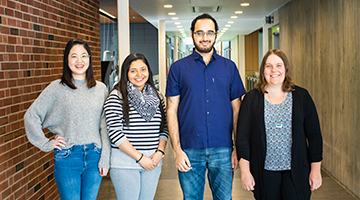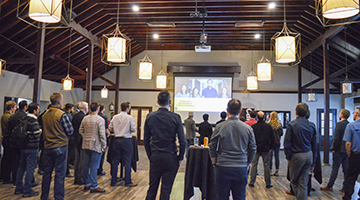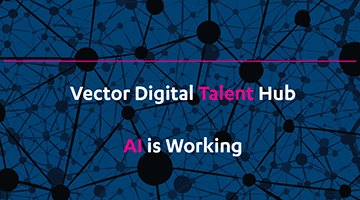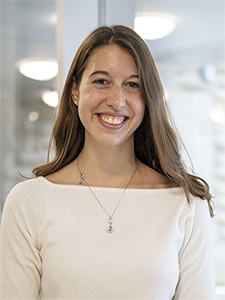Collaborative Specialization in Artificial Intelligence (M.Sc./M.A.Sc.)

Become an expert in one of the world's foremost and fastest-growing areas of technology.
The University of Guelph’s Collaborative Specialization in Artificial Intelligence (CSAI) provides thesis-based master’s students with a diverse and comprehensive knowledge base in artificial intelligence (AI). Students learn from a multidisciplinary team of faculty with expertise in fundamental and applied deep learning and machine learning, while conducting AI-related research guided by a faculty supervisor. Through a combination of online learning, lectures, team-based problem-solving and experiential learning opportunities, students obtain broad expertise in machine learning and AI, including essential skills in programming and algorithmic thinking, mathematical foundations and statistical analysis for AI, optimization, and data visualization. Students also develop an intimate understanding about the policy, regulatory and ethical issues related to AI and its uses.
"I really enjoyed my undergraduate experience at Guelph, which included multiple research co-op work terms. I was also especially interested in the Collaborative Specialization in Artificial Intelligence and my ability to integrate AI with my thesis in the field of Environmental Engineering.
My background in Environmental Engineering has lead me to pursue ways of improving our understanding of the complexities involved in environmental systems. Specifically, the goal of my research is to improve our understanding of flooding events, the specific mechanisms leading to these events, and the consequential impacts on human life and the surrounding environment."
Mostafa Elkurdy
Environmental Engineering (MASc), Collaborative Specialization in Artificial Intelligence
Focus Areas
The CSAI program is ideal for students interested in gaining advanced training and research opportunities in artificial intelligence, machine learning, bioinformatics, neural networks and deep learning, optimization, software engineering, image processing, among other AI-related focus areas.
Affiliated Programs
Our affiliated (thesis-based) programs include:
Master of Applied Science in Engineering
Master of Science (MSc) in Bioinformatics
MSc in Computer Science
MSc in Mathematics and Statistics
Career Opportunities
Graduates are in-demand by government and private industry, in positions that include machine learning researchers, computer vision engineers, data engineers and data scientists, software engineers, statisticians, and more.
Centre for Advancing Responsible and Ethical Artificial Intelligence (CARE-AI) Affiliation
CARE-AI's mission is to advance multidisciplinary AI training and research and its responsible application to improve life. With their shared focus on AI expertise, research and ethics, CSAI is an affiliate program of CARE-AI. Rather than considering ethics or responsibility as an afterthought at deployment time or thesis time, U of G embeds key issues such as fairness and bias, accountability, transparency and ethics from the start of the student's program in partnership with CARE-AI, beginning with UNIV*6080 Computational Thinking in AI.
In addition to program requirements, CARE-AI hosts event series focused on the "bigger picture" in developing and deploying AI systems. This is a unique forum for grad students, faculty, and community members across all disciplines to engage on these issues.
Vector Institute Affiliation
The CSAI program is a Vector Institute affiliated program. Its students become part of the Vector Institute’s community of renowned researchers, major Canadian companies, and AI startups solving high-impact problems.

Vector Scholarship in Artificial Intelligence
Students who are enrolled in the University of Guelph Collaborative Specialization in Artificial Intelligence are eligible to apply for Vector Scholarships in Artificial Intelligence, valued at $17,500 each. Both domestic and international students with first class standing (minimum A- in their last two years of full-time study) who have applied to the Specialization are eligible for consideration.
You can find more information at the Vector Institute website

Networking and Events
The Vector Institute’s exclusive events put you face-to-face with AI teams from major Canadian employers, providing unique access to career opportunities. Build relationships with a network of AI professionals that can become a spring of new opportunity, insight, and collaboration over your career.
You can find more information at the Vector Institute website

Digital Talent Hub
Discover career opportunities in the Vector Institute’s extensive industry network through the Digital Talent Hub, an exclusive online platform that curates AI-related job openings among top Canadian employers. Available only to the Vector community, the Digital Talent Hub is trusted by hiring managers and connects talent with a wealth of high-impact internship and full-time openings at leading companies.
You can find more information at the Vector Institute website
Students We Attract
Our students are top domestic and international students from undergraduate and graduate programs that include: Biostatistics; Computer Sciences; Computer, Electrical, Electronic, Environmental, Information Technology, Software, and Systems Engineering; Mathematics; and Physics.
What Our Students Are Saying

Alysha Cooper
Statistics (MSc), Collaborative Specialization in Artificial Intelligence
With an increase in data, improving technology and computational power, artificial intelligence will continue to evolve and be an aid in many issues. Although the idea of artificial intelligence taking over can seem daunting to individuals, I believe that if different fields collaborate to make ethical algorithms, it will benefit society in ways we can’t even imagine right now. Particularly in healthcare, AI has the potential to be a powerful tool in diagnosis, caretaking, and risk predictions.
Statistics and artificial intelligence excite me because it is interesting how you can use them to understand the relationship between variables or even make predictions for other observations. I always found enjoyment in analyzing data to answer research questions. The analysis in research is the most exciting part since it is when you find out whether your hypothesis was correct or if there is something else that can be observed in the data. The more I learn about statistics and artificial intelligence, the more excited I get by the potential of it and how it can be used. Read Alysha's full story.
About the Specialization
How does the program specialization work?
Prospective students must first meet the admission requirements of a participating home program (see: affiliated programs). Once the student is admitted to a home program, their application will be forwarded to the Collaborative Specialization’s Graduate Program Coordinator for review.
Students enrolled in the specialization must complete at least 2.25 credits in AI-related courses, as well as their home program requirements. Note that some credits in AI-related courses can satisfy both Collaborative Specialization in AI and home program requirements.
Course List
Masters students in the collaborative specialization in artificial intelligence must complete the following:
- UNIV*6080 Computational Thinking for Artificial Intelligence
- UNIV*6090 Artificial Intelligence and Society
One of the following elective core courses:
- CIS*6020 Artificial Intelligence
- ENGG*6500 Introduction to Machine Learning
- STAT*6801 Statistical Learning
Two of the following complementary AI-related courses**:
- BINF*6970 Statistical Bioinformatics
- CIS*6050 Neural Networks
- CIS*6060 Bioinformatics
- CIS*6070 Discrete Optimization
- CIS*6080 Genetic Algorithms
- CIS*6120 Uncertainty Reasoning in Knowledge Representation
- CIS*6160 Multiagent Systems
- CIS*6170 Human-Computer Interaction
- CIS*6180/DATA*6300 Analysis of Big Data
- CIS*6190/DATA*6400 Machine Learning for Sequential Data Processing
- CIS*6320 Image Processing Algorithms and Applications
- CIS*6420 Soft Computing
- ENGG*4460 Robotic Systems
- ENGG*6090 Image Analysis
- ENGG*6100 Machine Vision
- ENGG*6140 Optimization Techniques for Engineering
- ENGG*6570 Advanced Soft Computing
- ENGG*6600 Reinforcement Learning *Fall 2022 offering only
- MATH*6020 Scientific Computing
- MATH*6021 Optimization I
- MATH*6051 Mathematical Modelling
- PHIL*6400 Ethics of Data Science (formerly PHIL*6760 Science and Ethics)
- STAT*4000 Statistical Computing
- STAT*6721 Stochastic Modelling
- STAT*6821 Multivariate Analysis
- STAT*6841 Computational Statistical Inference
**Note: CSAI students can elect to take a second "elective core course" in lieu of a complementary AI-related course.
Click here for more information on course selection options according to home program.
Graduate Faculty
If you are interested in pursuing an AI-related master's thesis at the University of Guelph, then please contact one of the below-listed faculty members to see if your research interests align and to confirm if they are accepting students:
Bioinformatics Graduate Program Faculty (MASC.BINF+AI)
- Sarah Adamowicz, Associate Professor, Integrative Biology, Bioinformatics Graduate Program
- Ayesha Ali, Professor, Mathematics and Statistics, Bioinformatics Graduate Program
- Christine Baes, Associate Professor, Animal Biosciences, Bioinformatics Graduate Program
- Hermann Eberl, Professor, Mathematics and Statistics, Bioinformatics Graduate Program
- Mazyar Fallah, Professor, College of Biological Science, Bioinformatics Graduate Program
- Zeny Feng, Professor, Mathematics and Statistics, Bioinformatics Graduate Program
- Julie Horrocks, Professor, Mathematics and Statistics, Bioinformatics Graduate Program
- Cezar Khursigara, Professor, Department of Molecular and Cellular Biology, Bioinformatics Graduate Program
- Stefan C Kremer, Professor, School of Computer Science, Bioinformatics Graduate Program
- Lewis Lukens, Associate Professor, Plant Agriculture, Bioinformatics Graduate Program
- Khurram Nadeem, Associate Professor, Mathematics and Statistics, Bioinformatics Graduate Program
- Justin Slater, Assistant Professor, Mathematics and Statistics
- Dirk Steinke, Adjunct Professor, Integrative Biology, Bioinformatics Graduate Program
- Scott Ryan, Associate Professor, Department of Molecular and Cellular Biology, Bioinformatics Graduate Program
- Graham Taylor, Professor, School of Engineering, Bioinformatics Graduate Program
- Dan Tulpan, Assistant Professor, Animal Biosciences, Bioinformatics Graduate Program
- Yan Yan, Assistant Professor, School of Computer Science
Computer Science Graduate Faculty (MSC.CS+AI)
- Luiza Antonie, Associate Professor, School of Computer Science
- Neil Bruce, Associate Professor, School of Computer Science
- Rozita Dara, Associate Professor, School of Computer Science
- Ali Dehghantanha, Associate Professor, School of Computer Science
- David Flatla, Associate Professor, School of Computer Science
- Minglun Gong, Professor, School of Computer Science
- Gary Grewal, Associate Professor, School of Computer Science
- Andrew Hamilton-Wright, Associate Professor, School of Computer Science, Bioinformatics Graduate Program
- Stefan C Kremer, Professor, School of Computer Science, Bioinformatics Graduate Program
- Pascal Matsakis, Professor, School of Computer Science
- Charlie Obimbo, Professor, School of Computer Science
- Stacey Scott, Professor, School of Computer Science
- Fei Song, Associate Professor, School of Computer Science
- Petros Spachos, Associate Professor, School of Engineering
- Fangju Wang, Professor, School of Computer Science
- Mark Wineberg, Associate Professor, School of Computer Science
- Yan Yan, Assistant Professor, School of Computer Science
- Sheng Yang, Assistant Professor, School of Engineering
- Yang Xiang, Professor, School of Computer Science
Engineering Graduate Faculty (MASC.ENGG+AI)
- Hussein A Abdullah Professor, School of Engineering
- Shawki M Areibi, Professor, School of Engineering
- Andrew Binns Associate Professor, School of Engineering
- Scott Brandon, Assistant Professor, School of Engineering
- Fantahun Defersha, Associate Professor, School of Engineering
- Ibrahim Deiab, Professor, School of Engineering
- Bob Dony, Associate Professor, School of Engineering
- Bahram Gharabaghi, Professor, School of Engineering
- Karen Gordon, Associate Professor, School of Engineering
- Lei Lei, Associate Professor, School of Engineering
- Jana Levison, Assistant Professor, School of Engineering
- William Lubitz, Professor, School of Engineering
- Ed McBean, Professor, School of Engineering
- Medhat Moussa, Professor, School of Engineering
- Michele Oliver, Professor, School of Engineering
- Rafael M. Santos, Assistant Professor, School of Engineering
- Petros Spachos, Associate Professor, School of Engineering
- Graham Taylor, Professor, School of Engineering, Bioinformatics Graduate Program
- Eran Ukwatta, Assistant Professor, School of Engineering
- Sheng Yang, Assistant Professor, School of Engineering
- Simon Yang , Professor, School of Engineering
- Fattane Zarrinkalam, Assistant Professor, School of Engineering
Mathematics and Statistics Graduate Faculty (MSC.MAST-MATH+AI or MSC.MAST-STAT+AI)
- Ayesha Ali, Professor, Mathematics and Statistics, Bioinformatics Graduate Program
- Monica Cojocaru, Professor, Mathematics and Statistics
- Lorna Deeth, Associate Professor, Mathematics and Statistics
- Hermann Eberl, Professor, Mathematics and Statistics, Bioinformatics Graduate Program
- Zeny Feng, Professor, Mathematics and Statistics, Bioinformatics Graduate Program
- Julie Horrocks, Professor, Mathematics and Statistics, Bioinformatics Graduate Program
- Anna Lawniczak, Professor, Mathematics and Statistics
- Khurram Nadeem, Associate Professor, Mathematics and Statistics, Bioinformatics Graduate Program
- Mihai Nica, Assistant Professor, Mathematics and Statistics
- Justin Slater, Assistant Professor, Mathematics and Statistics
FAQ's
Collaborative Specialization in Artificial Intelligence (CSAI) Frequently Asked Questions
What are the requirements for the CSAI program?
The University of Guelph requires all master's students have successfully completed an undergraduate degree/baccalaureate, in an honour's program or the equivalent, from a recognized university and a minimum B- average in your last two years of full-time equivalent study. Your GPA is calculated using your last two full years of education. The eligibility requirements, including the minimum GPA standards, are set to ensure that incoming students are prepared to succeed in the program.
In addition to the affiliated department* requirements, you must have a research Statement and, ultimately, the thesis with a fundamental or applied AI component. You should also have prior knowledge of probability and statistics, calculus, linear algebra, data structures and algorithms, as can be found in undergraduate courses such as STAT*2120, MATH*1210, ENGG*1500 and CIS*2520. Programing experience, specifically Python, is considered an asset; self-taught is acceptable.
*Check the affiliated department’s minimum requirements here
Do I need to find a supervisor or advisor for this program?
Although you do not need an advisor to apply, it is challenging to get accepted without one. Your application goes into a general pool, and only faculty who are actively looking for additional students will look at them. We recommend you contact a faculty member to see if your research interests align and check if they are currently accepting students.
Tips to get potential advisor’s attention: Let them know why you think you would make a good student. Reference specific research you have done that has synergy with their research.
What are the English language requirements?
If your first language is not English, you will be required to submit the results of a standardized language test. Please use this link to find the University of Guelph’s minimum overall score requirements.
If your first language is not English, but you have completed prior post-secondary studies in which English was the language of instruction, you may request to have your English Language Proficiency requirement removed. These decisions are made on a case-by-case basis by the department you are applying to. When you apply, upload a letter explaining your situation when asked for your English language documentation.
What are the costs for this program?
The standard MSc/MASc tuition rates are applied to the CSAI program and there are no program-specific fees. Tuition Fees and other compulsory fees can be found here. When on the Student Financial Services page click on the link for the appropriate term and student status to find the appropriate rates and look for the line that shows MA/MSc/MASc/GDip.
How do I apply to the CSAI program?
Application Steps:
Step 1: Decide on a program, Bioinformatics, Computer Science, Engineering, Mathematics or Statistics; this affiliated program will become your home program.
Step 2: Contact a faculty member to see if your research interests align and to check if they are currently accepting students. Although it is highly advised you do not need a faculty advisor to apply; however, you will need one to complete the application process. (Exception, the BINF+AI program requires an agreed advisor prior to applying).
Step 3: Have all your documents ready; you will need a resume, transcript, two referees, and a Statement of Research Intent. Your Statement of Research Intent must demonstrate that the proposed research, and ultimately the thesis, has a fundamental or applied AI (Artificial Intelligence) component.
Step 4: Apply to the affiliated department on OUAC (Ontario Universities Application Centre). (You can find deadlines and individual requirements for each of these programs on their links included below)
Step 5: Once you have applied, the affiliated department will review your application; if approved, it will be forwarded to CSAI to approve your application's AI component.
Affiliated Programs:
What is the application deadline?
The CSAI deadline is ongoing; however, each program has its own set deadlines. Please check with the affiliated department for their deadlines.
Program Contacts
Program Director and Graduate Program Coordinator:
Graham Taylor
Graduate Program Assistant:
Farrah Trahan
Please direct all inquiries to:
csaigrad@uoguelph.ca
